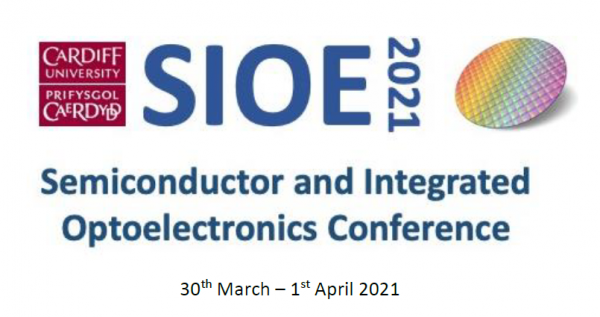SIOE 2021
10 May 2021

It was with great pleasure that we welcomed friends old and new to the 34th Semiconductor and Integrated OptoElectronics (SIOE) Conference, from 30th March to 1st April 2021.
Following the unfortunate cancellation of SIOE in 2020, The Future Compound Semiconductor Manufacturing Hub was determined to deliver SIOE in 2021. Through careful choice in online tools, the elements which are key to SIOE were successfully translated into an exciting online programme. This meant that over three days, over 260 delegates could enjoy live talks on a wide range of topics from invited international speakers with opportunities for collaboration and communication.
On Tuesday afternoon, the programme began with a welcome address from Professor Peter Smowton, followed by the first oral presentations. Across the conference, over 80 oral presentations covered a wide range of expertise, including: Materials Development and the impact of materials innovations on devices; New Approaches for Datacom/Telecom Wavelength Lasers; Lasers and Laser Systems; Compound Semiconductor Devices on Silicon; Detectors and Related Materials; Modulators and Modulation.

SIOE were delighted to welcome two invited speakers. First, Professor Weng Chow from Sandia National Laboratories in Albuquerque, New Mexico joined on Wednesday afternoon. Professor Chow delivered a thought-provoking talk on p-doping in quantum dot lasers, summarising recent work on Quantum Dot laser modelling and design. And on Thursday, we were pleased to welcome Professor Asa Haglund from Chalmers University of Technology, Göteborg. Professor Haglund delivered a fantastic talk on very short wavelength VCSELs and light emitters.

To ensure SIOE 2021 did not lack the interactive element so important to academic exchange, SIOE utilized the platform SpatialChat for poster presentations, allowing delegates to interact and talk with poster presenters, other delegates and to make new connections. Not only did spatial offer opportunity to network and connect with new colleagues, but the platform was also the venue for a careers session supported by the CS Hub and CS Cluster, focusing on Compound Semiconductor careers including current job opportunities in South Wales and beyond.
Every year, SIOE offers a meeting place for innovation between academic and industry excellence and implementation. This year was no different, illustrated by the highly fruitful panel session exploring the integration of Electronics and Photonics. We were very pleased to welcome our invited panel members who provided prompts to begin our session: Dr Amy Liu from IQE; Dr Haisheng Rong from Intel; Prof. Kevin Williams from Eindhoven University of Technology; Prof. Tao Wang from Sheffield University, and Dr Aaron Zilkie from Rockley Photonics. Delegates then joined breakout rooms to consider questions pertinent to the area before returning for further discussion.

We are grateful for the support from our sponsors, The Institute of Physics Semiconductor Group, The Institute of Physics in Wales and the Compound Semiconductor Centre (CSC). As well as supporting the conference for a number of years, this year they enabled the awarding of prizes to the best presentations and posters. We congratulate:
- Robert Richards, Dominic Duffy, Andreas Thurn, Joshua Robertson, Shujie Pan and Bo Hou who won the IOP Semiconductor Physics Group SIOE Merit awards for oral presentations.
- Bogdan Ratiu who won the CSC SIOE best oral presentation
- Huiwen Deng and Giorgos Boras who won the IOP Wales SIOE poster prizes
In the past year, we have made many adjustments to online working, and an online conference is very different to one in person. However, SIOE 2021 showed us that there can be still successes and collaboration working online.
That being said, we look forward to SIOE 2022 when we hope to be able to host our academic and industry collaborators old and new in-person.
Cardiff University is home to the Institute for Compound Semiconductors (ICS) which aims to position Cardiff as the European leader in compound semiconductors, providing cutting-edge facilities that help researchers and industry work together. The Institute will move to a brand-new home – the Translational Research Hub – in 2022, complete with a state-of-the-art 8-inch fabrication line within a purpose built cleanroom facility.
